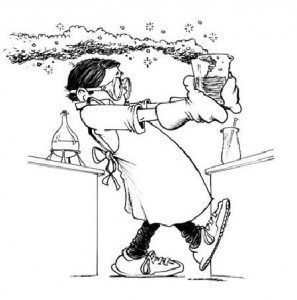As synthetic biology research and applications rapidly expand, a broader scrutiny of human and environmental health and safety issues is necessary to ensure necessary research doesn’t impose unnecessary risks.
Watch this new video from the Center for Responsible Genetics:
[If video fails to work, click here.]
For more info read GeneWatch magazine on Biolab Health and Safety at:


Comments
11 responses to “Video: Biolab Health & Safety, from Council for Responsible Genetics”
Are there no scientists or professors who study biology and do synthetic biology research presenting? How can this be a dialogue if only one side is represented?
Why are you holding such a one sided conference? I don’t see any of the leaders in synthetic biology on this page. As a graduate student in genetics I can tell you the fear is overblown and it is irresponsible for you to hold such talks without representing both sides. I would expect you to have a speaker like Drew Endy or Jay Keasling or one of the many other bay area based bioengineering professors there to help argue from the perspective of the scientific community.
Please make an effort to represent your views by participating at this event.
It’s good of you to encourage scientists to come as attendees, but that’s a very long way from having synthetic biology experts invited as panelists or speakers. It suggests pretty strongly that you don’t intend to give equal coverage to their views. I can tell you that synthetic biologists think CONSTANTLY about the possible ethical, environmental, economic, social and scientific ramifications of their work. If you’re concerned about those issues too, you should be talking with synbio practitioners, not just about them. Have you contacted Drew Endy of Stanford, as Justin suggested above? He’s not far away and I can guarantee you he would jump at the chance to help educate the community about synthetic biology and bring some facts to the discussion (though at this point it’s getting to be short notice!).
Thanks for your comment, and your concern that all views be heard. We will be glad to have Dr. Endy and others in the field share their views at this event — but our primary intention, in the brief 2 hours we have at our disposal, is to air views about synthetic biology that have had much less exposure than those of the industry leaders. We have no doubt that the leading thinkers in the field give much thought to the ethical and environmental concerns, as they should and must — but as leaders in the field, they are given to a particular set of notions regarding such concerns, and have extensive fora at their disposal in which to express their knowledge and insights.
The primary speakers at this event are people who work in communities (academic communities, lab communities, and real world communities, such as Richmond, and Brazil) that are being effected by the emergence and expansion of synthetic biology. To Mr Smith’s point that it is ‘irresponsible’ to hold a talk without inviting leaders in the field, that is simply absurd: our responsibility is not to ‘the scientific community’ (as if that were one unified entity), but to the public.
The point is, this is a public dialogue, for the public to express its views; this is not a polarized issue with two sides, but a multi-faceted issue area with far-ranging implications for worker safety, public health, land-use planning, local economies, scientific research, and government regulatory oversight; our intention is not to push ‘one’ side at the expense of another, but to create what we hope will be the first in a series of fora to allow a multitude of views to be expressed. We hope you will attend and express your views, while giving respectful attention to the views of those who may not be heard in the academy.
Thanks,
synbiowatch
I support this meeting’s focus on community, although I echo the sentiment that adding “synthusiasts” to the program would create a more balanced and informed discussion. Scientists are also citizens of our community whose kids drink the same tap water and breathe the same air as the rest of us, and so they share most of the same concerns that we have.
Jay Keasling had his own conference a few years ago at the Berkeley Repertory theatre. I found him to be very dismissive even mocking toward public concerns about the resulting “ethical, environmental, economic, social and scientific ramifications of his work”. His concerns are not humanitarian but motivated by the bottom line and the almighty dollar as outlined this week in the news
http://www.mercurynews.com/business/ci_20054409
he is beholden to the 1% (I prefer 10%, but 1% will do for now).
[…] part of our ongoing coverage of synthetic biology, and in conjunction with our upcoming event, Unmasking the Bay Area Bio-Lab and Synthetic Biology, Climate Connections is making the new declaration available, here. On the release of the […]
[…] part of our ongoing coverage of synthetic biology, and in conjunction with our upcoming event, Unmasking the Bay Area Bio-Lab and Synthetic Biology, Climate Connections interviewed Eric Hoffman, Food and Technology Policy Campaigner at Friends of […]
“Unmasking the Bay Area Bio Lab and Synthetic Biology at Risk” sounds pretty polarized to me.
I just watched the youtubes of the event and I’m astonished that the organizers honestly think that “our intention is not to push ‘one’ side at the expense of another” (response to Jeff, above). In fact, the panel was comprised only of people who could charitably be called ‘anti-biotech’. To wit, when asked if there are any benefits to synthetic biology, the only thing offered was along the lines of “well, may be some interesting basic science.” Really? The panelists couldn’t think of anything potentially useful? Even insulin from recombinant E. coli was described by the moderator as a net bad. At the least, I’m guessing that all the patients, including members of my family, who have avoided immunogenic reactions associated with pig insulin (the only source of the drug before Genentech) would strongly disagree.
If the panelists really couldn’t think of any potential benefit of synthetic biology, then this reflects not only a clear lack of imagination, but also is an indication, as others pointed out above, that other inputs were sorely needed. While it might be true that scientists are overly optimistic about the benefits of synthetic biology, the cynicism on display by the forum panel was breathtaking. I found the lack of thoughtfulness and nuance in the presentations very depressing. If SYNBIOWATCH expects to play a constructive role in shaping research and safety agendas (as compared to being known as cranks and propagandists), it is really going to have to work harder to build credibility.